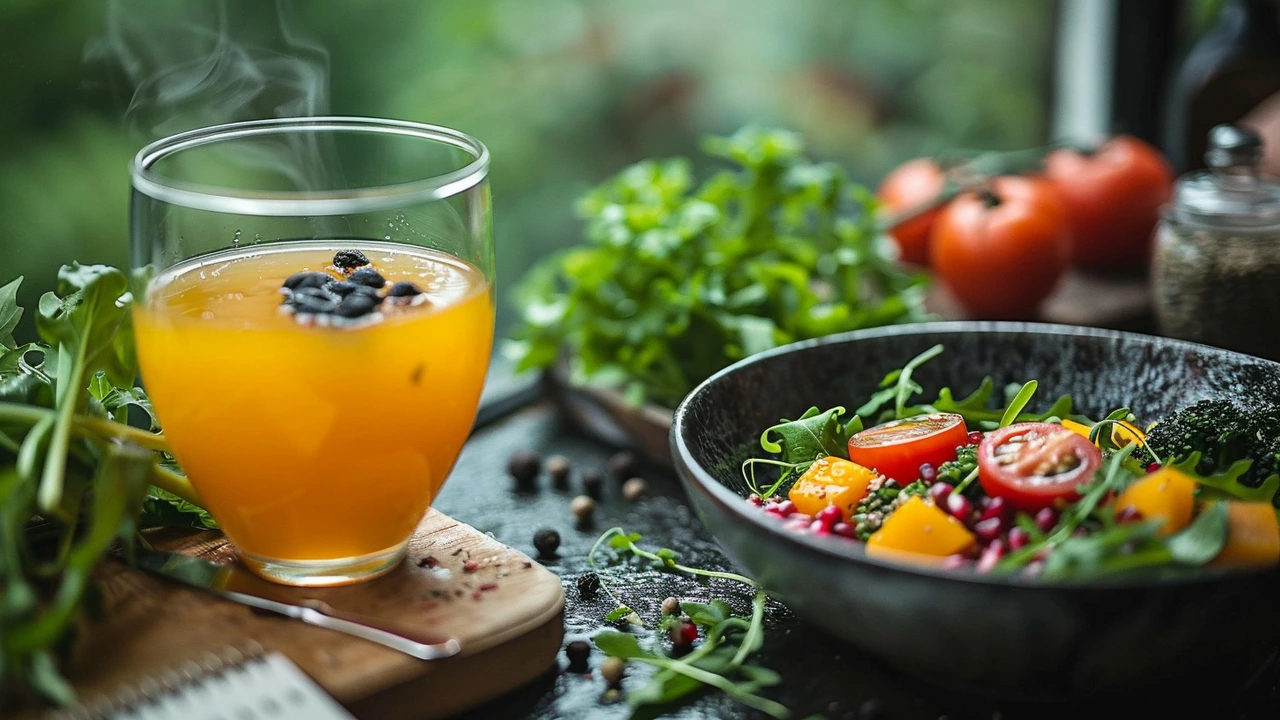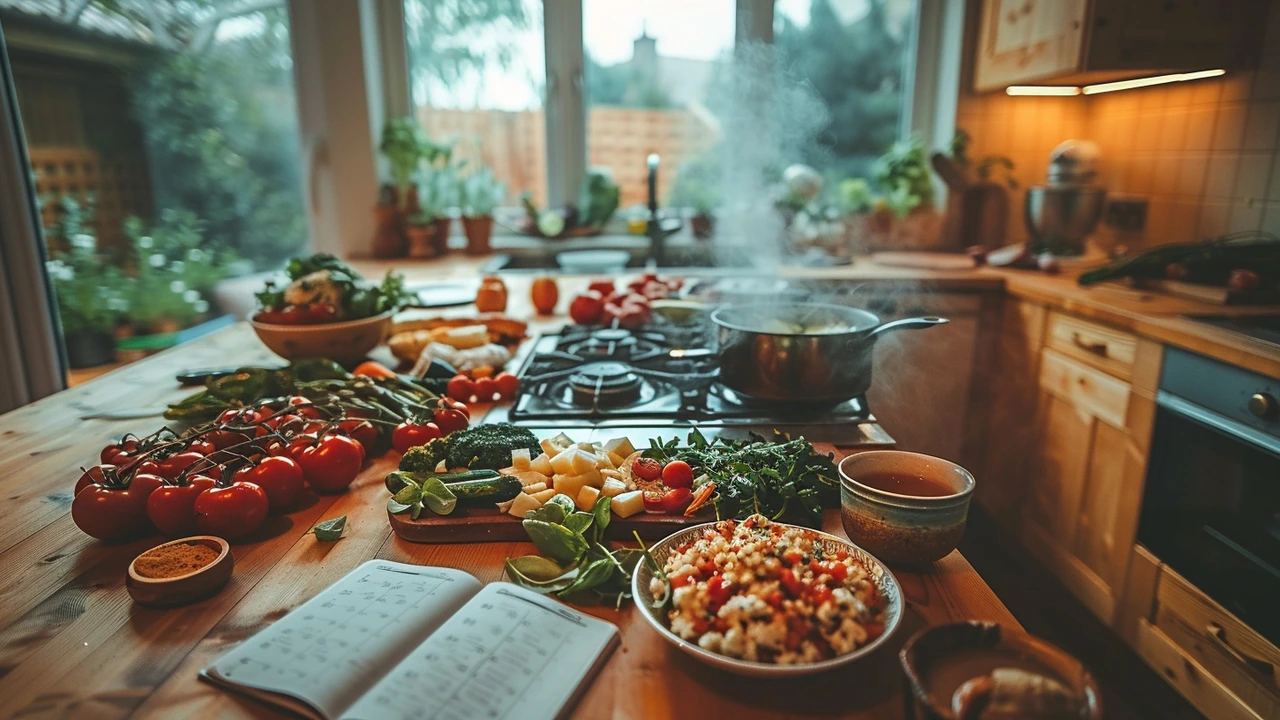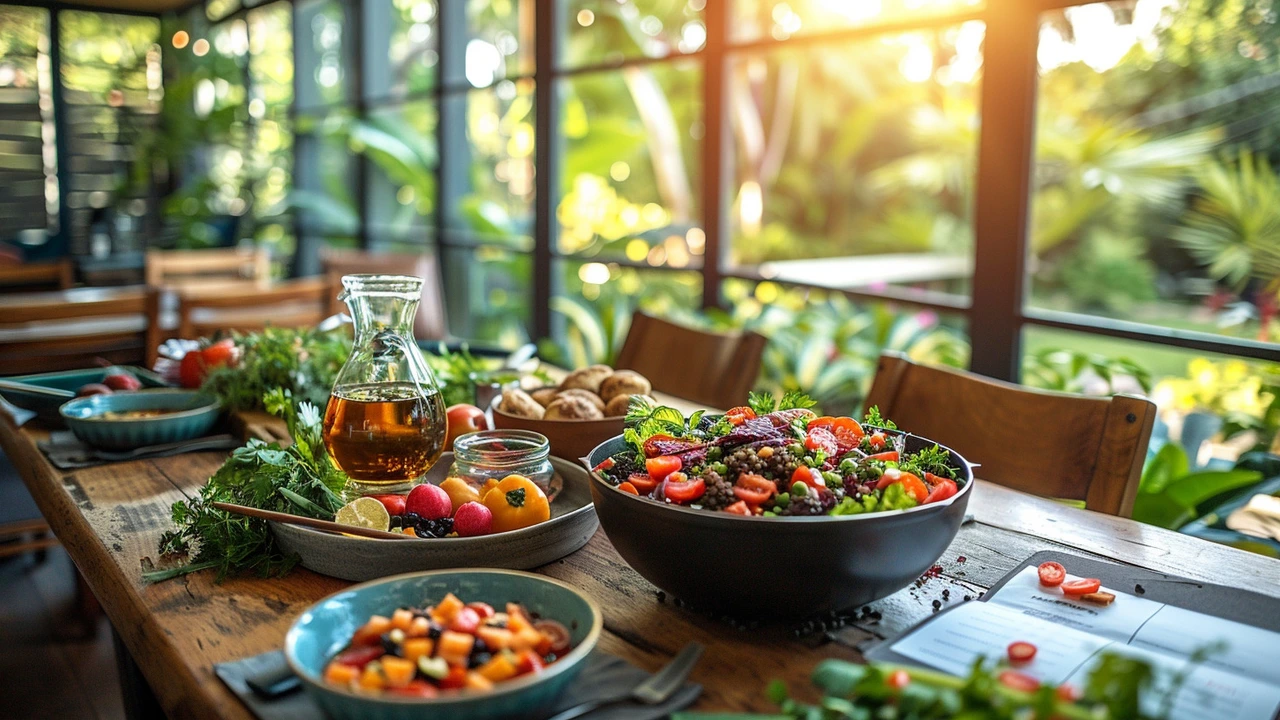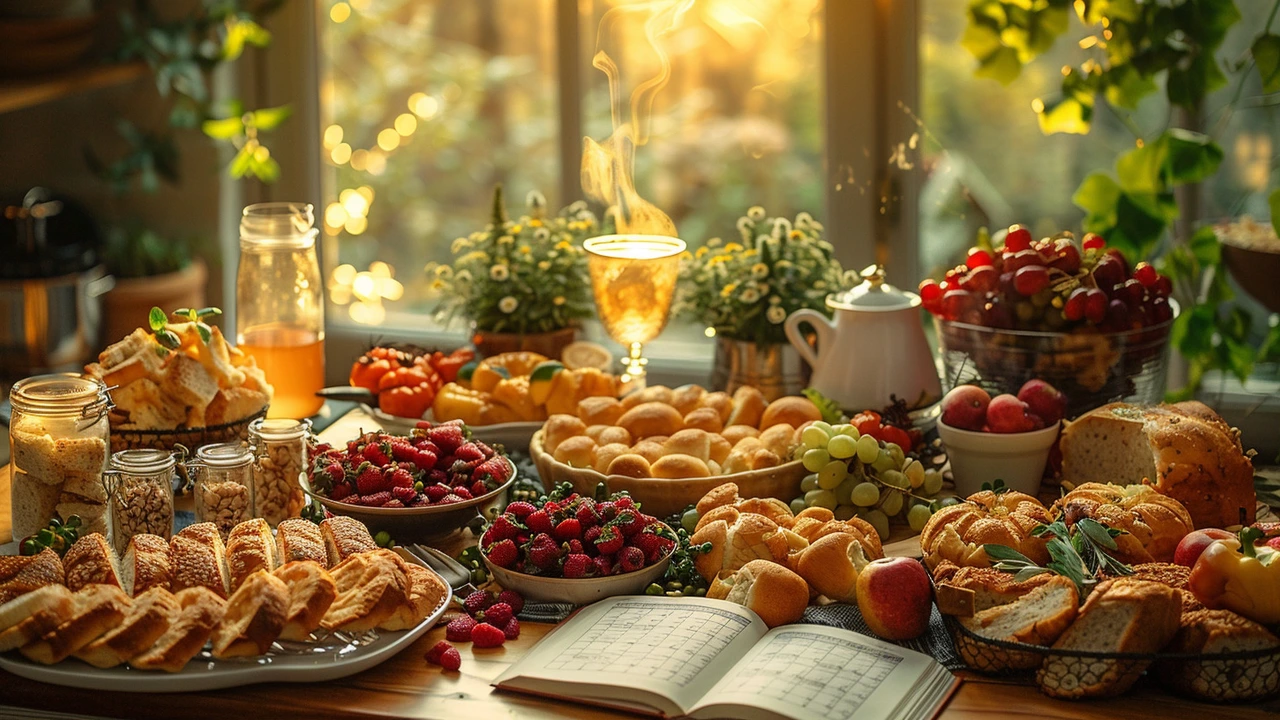We all know eating right keeps our bodies in shape, but did you know it could help you sleep better too? It turns out there's a strong connection between what you put on your plate and the quality of your shut-eye.
In this article, we'll dig into how certain foods and habits can be a game-changer for those sleepless nights. From nutrient-rich ingredients to avoid-before-bed snacks, you’ll find tips and facts to help you rest easy.
- The Link Between Diet and Sleep
- Foods That Promote Better Sleep
- Eating Habits for a Restful Night
- Foods to Avoid Before Bed
The Link Between Diet and Sleep
What you eat during the day can play a huge role in how well you sleep at night. This may sound surprising, but there's plenty of science to back it up. Your body relies on certain nutrients to produce sleep-regulating hormones like serotonin and melatonin. Without the right balance of vitamins and minerals, you might find it harder to drift off or stay asleep through the night.
For example, foods rich in amino acid tryptophan, such as turkey, eggs, and cheese, help boost melatonin levels. Melatonin is the hormone responsible for controlling sleep-wake cycles. Additionally, complex carbohydrates found in whole grains can enhance the availability of tryptophan in the brain, promoting better sleep.
Magnesium and potassium are other crucial players in the sleep game. Magnesium helps maintain normal muscle and nerve function, which can relax you and reduce restless nights. Foods like nuts, seeds, and leafy greens are excellent sources. Potassium, found in bananas and sweet potatoes, can help prevent muscle cramps that disturb sleep.
Nutritionists and sleep experts have also noted the importance of maintaining steady blood sugar levels. Foods that cause spikes and crashes in blood sugar, like sugary snacks and refined carbs, can interfere with your sleep patterns. On the other hand, foods that promote steady blood sugar levels, such as fiber-rich vegetables and legumes, contribute to more restful sleep.
According to Dr. Michael Breus, a clinical psychologist and board-certified sleep specialist, "What you eat and drink in the hours leading up to bedtime can have either a positive or negative impact on the quality of your sleep."
Water intake is equally important. Staying hydrated is key, but drinking too much right before bed can lead to frequent trips to the bathroom, disrupting your sleep cycle. Aim to get most of your fluids earlier in the day to avoid this issue.
The timing of your meals can also impact sleep quality. Having a large meal right before bed can cause discomfort and indigestion, making it hard to fall asleep. Try to eat dinner at least two to three hours before hitting the sheets to give your body ample time to digest.
Finally, don't overlook the importance of making sustainable changes. Crash diets and extreme eating patterns can do more harm than good. Gradually introducing more sleep-friendly foods and habits will set you up for long-term success.

Foods That Promote Better Sleep
Did you know that some foods can actually help you fall asleep faster and improve the quality of your sleep? Paying attention to what you eat can be a game-changer for your nightly rest. One key player in the sleep game is tryptophan, an amino acid that's found in many foods and helps your body produce the sleep-inducing hormone melatonin.
Poultry like turkey and chicken are rich in tryptophan. You've probably heard about Thanksgiving turkey making everyone sleepy; that's no myth. Dairy products like milk and cheese also contain tryptophan. Drinking a glass of warm milk before bed, a traditional remedy, has scientific backing. The warmth can be soothing and the tryptophan can help you drift off.
Whole grains such as oats and barley can also boost melatonin production. They are complex carbs which, unlike simple carbs in sweets, won't spike your blood sugar and disrupt your sleep. A bowl of oatmeal with some honey in the evening can be comforting and beneficial.
Nuts like almonds and walnuts are another great choice. Almonds contain magnesium, which can relax muscles and ease the mind, while walnuts have their own boost of melatonin. If you're looking for a light snack before bed, a handful of nuts might do the trick.
Fruits like bananas, kiwis, and cherries offer sleep-supportive nutrients. Bananas provide potassium and magnesium, which can relax your muscles and nerves, and they also contain tryptophan. Kiwis are high in antioxidants and serotonin, both of which can improve sleep quality. Cherries, particularly tart cherries, are a natural source of melatonin. Drinking tart cherry juice has been shown to lengthen sleep time and improve sleep efficiency.
Incorporating herbs such as chamomile and valerian root into your diet can also be beneficial. Chamomile tea has been used for centuries to aid sleep, thanks to its calming effects and the antioxidant apigenin that binds to brain receptors to promote sleep. Valerian root is another herb known for its mild sedative properties, available in teas and supplements.
According to Shelby Harris, a sleep psychologist, "What you eat – and when you eat it – can have an effect on how well you sleep at night." It's not just about avoiding certain foods but actively incorporating sleep-friendly choices into your diet.

Eating Habits for a Restful Night
The way you eat can have a big impact on how well you sleep. It's not just about what you eat, but also when and how much you eat. A balanced diet full of nutrient-rich foods like fruits, vegetables, lean proteins, and whole grains can set the stage for better rest. However, having a few guidelines can make the process easier.
First, try to keep a regular eating schedule. Your body has a natural clock, also known as the circadian rhythm, and it likes consistency. By eating meals at the same times each day, you help regulate your internal clock. This can help you feel sleepy and wakeful at the right times.
Another essential point is to avoid heavy meals late in the evening. Big meals close to bedtime can cause discomfort and indigestion, making it harder to drift off. Instead, aim to finish your last substantial meal at least 2-3 hours before you plan to go to bed. If you need a snack, go for something light, like a small piece of fruit or a handful of nuts.
You might also want to pay attention to what you drink. Caffeine and alcohol can interfere with your sleep cycles. While it might be tempting to have that late-afternoon coffee boost, try to limit its intake to the morning hours. Likewise, although a nightcap might make you feel drowsy, it actually disrupts the quality of your sleep.
Hydration plays an important role as well. Drinking plenty of water throughout the day keeps you hydrated, but cut off your fluid intake an hour or two before bed to avoid waking up for bathroom breaks.
Finally, practicing mindful eating can make a difference. Slow down and enjoy your meals, paying attention to flavors and textures. This can help with digestion and even reduce stress levels, which are often a culprit for sleepless nights.
"A varied diet that includes all macro and micronutrients is key for good sleep hygiene. Make sure you’re eating enough fiber, getting your vitamins, and staying hydrated," says Dr. Michael Grandner, a sleep expert at the University of Arizona.
By making these small changes to your eating habits, you can pave the way to more restful nights and energized days.

Foods to Avoid Before Bed
If you’ve ever found yourself tossing and turning at night, your late-night snack might be to blame. Certain foods can interfere with your ability to fall asleep and stay asleep. Eating habits, especially before bedtime, play a crucial role in the quality of your slumber.
First off, let's talk about caffeine. It's a well-known fact that caffeine is a stimulant, and consuming coffee, tea, or even chocolate late in the day can disrupt your sleep cycle. The stimulating effects of caffeine can last for hours, making it harder for you to drift off to sleep. Try to limit your intake in the afternoon and evening to see if it makes a difference.
Next up on the list are sugary foods and refined carbohydrates. That late-night sweets craving might give you an initial rush, but it can ultimately lead to a restless night. High sugar levels can cause energy spikes and crashes, which can disturb your sleep. Instead, opt for a piece of fruit or a handful of nuts if you need something to nibble on before bed.
Spicy foods can also be problematic for sleep. They often cause indigestion and heartburn, which are not the companions you want when trying to relax. If you enjoy spicy dishes, consider having them for lunch instead of dinner. This gives your body enough time to digest them properly before bedtime.
Another category to watch out for is fatty and fried foods. They take longer to digest and can keep your stomach busy while the rest of you is trying to wind down. These foods may lead to discomfort and bloating, making it difficult to sleep soundly. Switching to lighter dinner options can help find a balance between satisfying your hunger and not overstaying its welcome in your digestive tract.
Alcohol is a tricky one. While a nightcap might seem like it helps you unwind, alcohol can disrupt your sleep cycle. It may help you fall asleep faster initially, but it alters the stages of sleep and can prevent deep, restorative sleep. Cut back on alcohol in the evenings to notice a better sleep pattern.
Heavy meals in general should be avoided close to bedtime. It's not just about what you eat but when you eat it. Large meals can cause your stomach to work overtime, which is not ideal when you're trying to get some rest. Try to have dinner at least two to three hours before bed to give your body adequate time to digest.
Lastly, be cautious with acidic foods like citrus fruits and tomatoes. They can cause acid reflux, leading to an uncomfortable night. Opt for less acidic foods in the evening for a better night's sleep.
As sleep expert Dr. Michael Breus puts it,
“Your diet profoundly impacts your sleep. Small changes in what and when you eat can lead to significant improvements in sleep quality.”It’s amazing how adjusting your diet can help you sleep better. So, take a close look at your late-night eating habits, and experiment to see what works best for you.







